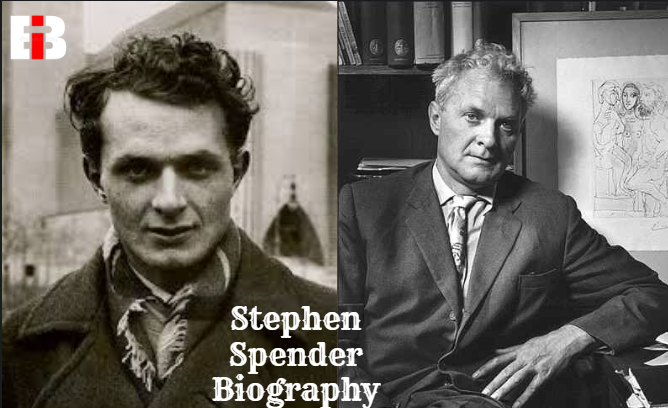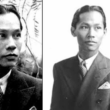Stephen Spender Biography – Stephen Spender was an English poet, essayist, and novelist who made a significant impact on literature in the 20th century. Known for his dedication to social justice, his writings often centered around the class struggle, a reflection of his personal experiences and observations.
Let’s take a closer look at his life, from his literary achievements to his family and personal relationships.
Stephen Spender Biography
Early Life and Background
Stephen Harold Spender was born on February 28, 1909, in Kensington, London. He was the son of journalist Harold Spender and Violet Hilda Schuster, a woman of German-Jewish heritage who was both a painter and poet. Growing up, Spender had an early introduction to literature and art through his parents’ professions.
His upbringing was marked by an exposure to both British and German cultures, particularly from his mother’s side. This cultural duality would later influence some of his works, especially as he became more involved with European politics and intellectual movements.
Education and Early Friendships
Stephen attended various schools, including Hall School in Hampstead and Gresham’s School in Holt, but found school life challenging. After the death of his mother, he transferred to University College School in Hampstead, which he fondly described as a gentler experience.
His educational journey took him to University College, Oxford, but Spender left without completing a degree. His time at Oxford, however, introduced him to some of the most influential literary figures of the time. Among them was W. H. Auden, a poet who would become his close friend and mentor. Through Auden, Spender met other notable writers such as Christopher Isherwood and Louis MacNeice, forming a group later known as the Auden Group.
Literary Career and Notable Works
Stephen Spender’s early literary success came with the publication of his poetry collection Poems in 1933. His poetry often touched on themes of social injustice, poverty, and the class struggle—concerns that were deeply personal to him.
One of his major works, The Temple, published in 1988, was partly autobiographical, drawing on his experiences in Germany during the Weimar Republic. The novel explored the themes of personal freedom, censorship, and the rise of fascism, reflecting his observations of pre-Nazi Germany.
Some of Spender’s other notable works include:
- The Truly Great (poem)
- The God That Failed (1949)
- Trial of a Judge (1938)
- Forward from Liberalism (1937)
Political Views and Activism
Spender was politically active, especially in the 1930s. He briefly joined the Communist Party of Great Britain in 1936 and was sent to Spain to observe the Spanish Civil War. His time there left a profound impact on his views, although he soon became disillusioned with communism, leading him to distance himself from the party.
His writings during this period reflect his political engagement. His long poem Vienna praised the socialist uprisings of 1934, and he later collaborated on The God That Failed, a collection of essays from former communists about their disillusionment with the movement.
Marriages and Family Life
Stephen Spender’s personal life was as complex as his political and literary one. His first marriage was to Inez Pearn in 1936, though it ended in divorce just three years later. Spender’s romantic relationships were often tangled with his literary and political worlds.
In 1941, Spender married Natasha Litvin, a concert pianist. This marriage lasted the rest of his life, and Natasha played a significant role in supporting his literary career. Spender’s relationship with Tony Hyndman, a former Welsh Guardsman and a significant figure in his life, was also notable, reflecting his complex sexuality.
Stephen Spender’s Children
Stephen Spender and his wife, Natasha, had two children. Their daughter, Lizzie Spender, went on to become an actress, and their son, Matthew Spender, became a sculptor. Spender’s family life, though often marked by the tensions of his political and social commitments, was one of support and mutual respect.
Achievements and Awards
Spender’s contributions to literature were widely recognized. In 1965, he was appointed as the U.S. Poet Laureate Consultant in Poetry to the Library of Congress, a prestigious position. He was knighted in 1983 for his services to literature and also became a Commander of the Order of the British Empire (CBE) in 1962.
Throughout his career, Spender was also deeply involved in literary circles. He co-founded Horizon magazine, served as an editor for Encounter, and contributed to many literary and political discussions through his writing and teaching.
Later Life and Teaching Career
In his later years, Spender turned to teaching. He became Professor of English at University College London from 1970 to 1977 and also lectured at various institutions in the United States, including the University of California at Berkeley. His passion for education and literature continued until his death, as he helped shape the minds of future generations of writers.
Cause of Death
Stephen Spender passed away on July 16, 1995, at the age of 86 due to a heart attack. His death marked the end of a life dedicated to literature, social justice, and political activism.
Legacy and Influence
Stephen Spender left an indelible mark on the literary world, particularly for his engagement with social issues and his unique voice in modernist poetry. His friendships with literary giants like W. H. Auden and T. S. Eliot, combined with his own works, ensured his place in the annals of 20th-century literature.
His influence extended beyond poetry. Spender was deeply involved in the intellectual and political debates of his time, contributing to the shaping of mid-century European thought. His legacy lives on through his works and the institutions he helped build, including Index on Censorship.
FAQs
1. Who was Stephen Spender’s wife?
Stephen Spender was married twice. His first wife was Inez Pearn, and his second wife was Natasha Litvin, a concert pianist, whom he married in 1941.
2. How old was Stephen Spender when he died?
Stephen Spender was 86 years old at the time of his death on July 16, 1995.
3. What were Stephen Spender’s major works?
Some of Stephen Spender’s major works include Poems (1933), The God That Failed (1949), and The Temple (1988).
4. What caused Stephen Spender’s death?
Stephen Spender died from a heart attack in 1995.
5. What were Stephen Spender’s political views?
Stephen Spender was involved with the Communist Party in the 1930s but later became disillusioned with communism. He continued to support social justice causes throughout his life.







